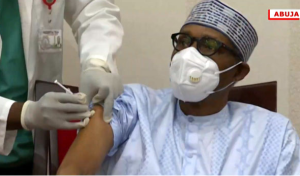
The Federal Government has directed states administering the AstraZeneca COVID-19 vaccine to stop vaccination when they use half of the doses allocated to them.
It was gathered that the directive was given by the Director of the National Primary Health Care Development Agency (NPHCDA), Dr. Faisal Shuaibu.
This means that a state that was given 100,000 doses would have to stop vaccination once the doses hit 50,000 in order for those who have received their first jab to get their second.
This became necessary due to a possible delay in the supply of the next batch of the AstraZeneca vaccines.
The delay is caused by a surge in the demand by the European Union and a new policy by India which manufactures the vaccine. India had said last week that it would prioritise domestic vaccination for its over 1.2 billion citizens.
Speaking to The PUNCH, the Minister of State for Health, Dr Olorunnimbe Mamora, confirmed the new directive to states.
He said states were asked to stop vaccination halfway until more vaccines arrive because it was the smartest thing to do since it is a double-dose vaccine.
“On the issue of stopping at half doses, we thought this is what wisdom dictates because in a situation where we seem to be in short supply, it stands to good reason to ensure that those who have had their first dose should be given the opportunity of having the second dose.
“It is better to have a pool of people who have received full vaccination rather than just do it halfway for everybody, which I think would not be the best in the circumstance. And you are not really covered if you have your full dosage,” he said.
Mamora, who said he was not sure when more vaccines would be available, disclosed that the federal government was already having talks with other parties including Russia, which is producing the Sputnik V vaccine.
“The truth is there is a challenge. However, we are not hopeless. The COVAX facility is not the only one we rely on,” he said.
“There is also AVATT, the regional facility which is the African Vaccine Acquisition Task Team. So, we definitely will be looking to AVATT to help increase the initial allocation in the circumstances with what is happening vis-a-vis production and supply from India.
“Both AVATT and COVAX are multilateral facilitators, but we also have bilateral negotiations. For example, the Sputnik is bilateral in the sense that it is government to government. Sputnik is Russian and as soon as we have the dossier and approval from NAFDAC, then we will consider it.”


